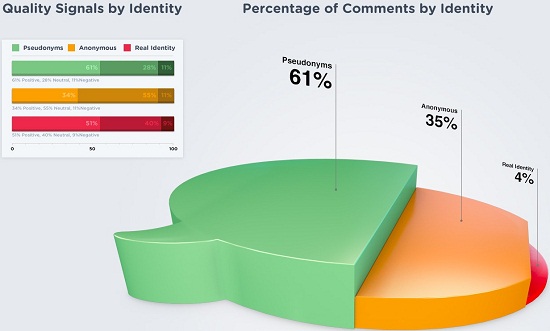![]() There is an ongoing discussion recently among many bloggers about if and how to allow blog commenting by the visitors. Some claim blogs should enable complete anonymity (if the visitors wish for that), other claim visitors must use their real names to comment (using a platform like Facebook Comments) and some even claim they don’t need comments at all.
There is an ongoing discussion recently among many bloggers about if and how to allow blog commenting by the visitors. Some claim blogs should enable complete anonymity (if the visitors wish for that), other claim visitors must use their real names to comment (using a platform like Facebook Comments) and some even claim they don’t need comments at all.
The Battle Against Spammers and Trolls
In the center of the argument stands the spammers and the trolls (posting off-topic comments). The ones who are for anonymity commenting claims that filtering comments is an integral part of the blogger job and the ones who are for real names commenting claim that it is the best way to provide really quality genuine community discussion.
I personally provide the visitor the option to comment anonymously in my blog, however, i have to say that i tend to approve comments very rarely and only when they are really contributing to the general page’s content as i constantly fighting against spammers. As other bloggers, i also find myself asking if there isn’t a better solution for this issue.
The popular commenting platform, Disqus, is providing a semi-answer to the problem: Users are partially authorizing themselves to the service upon registration and can comment with their Disqus account at any blog where the platform is installed (currently on more than 1.1 million sites). Additionally, it is possible to comment anonymously with the platform.
Disqus Pseudonyms Research
Lately, Disqus published a research about pseudonyms (fictional names) commenting and its quality when registering to the comment platform service. It founds that pseudonyms are leaving much more comments in general than either anonymous or real identity contributors with a higher quality of comments.
The research is indicating that 61% of Disqus comments comes from pseudonym users, 35% from anonymous users and only 4% from real identity users. Pseudonyms also perform better in terms of quality- 61% of pseudonyms comments considered positive compared to 51% of real identity and only 34% of anonymous comments.
Surprisingly enough, the gap of negative comments between pseudonyms and anonymous (11%) to real identity (9%) is very low. To determine the comments quality, positive comments were measured by the number they were liked and replied to, where negative comments were measured by the number they were flagged, marked as spam and deleted.
